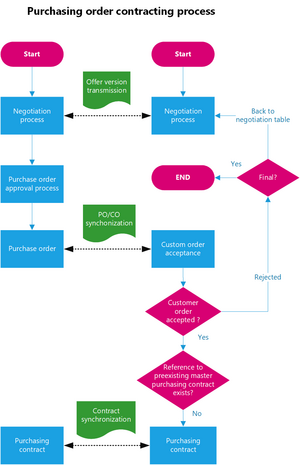Difference between revisions of "Purchase order"
Stefanseiler (talk | contribs) |
Stefanseiler (talk | contribs) |
||
| (3 intermediate revisions by the same user not shown) | |||
| Line 1: | Line 1: | ||
A purchase order is a '''one sided declaration''' of a customer towards a supplier. | [[File:Purchasing Process.png|thumb|Purchasing order contracting process]]A purchase order is a '''one sided declaration''' of a customer towards a supplier, which requires a contract to exist to be legally binding for the customer and the supplier side. | ||
== | == Interaction with suppliers / Contracting == | ||
Before a purchase order is created by the customer, the contracting phase is started, which means that customer and suppliers exchange offers until a mutual agreement is found ([[Purchasing contract|purchase contract]]). | |||
<u>Purchase order, created with contract reference (master contract based purchase order)</u> | |||
Once this [[Purchasing contract|purchase contract]] exists, a purchase order can be filed from the customer to the supplier with a reference to this contract. In this case, the supplier's digital only checks if the [[Customer Order|customer order]] positions and conditions adhere to the contract and can auto-approve it. | |||
<u>Purchase order, created without contract reference (Individual purchase order)</u> | |||
Purchase orders can also be filed to the supplier without a contract reference. In this case the positions and conditions of the purchase contract are considered to bear a purchasing contract proposal. The purchase order is showing a [[Customer Order|customer order]] on the supplier side, which is subject to approval on the customer side. Once approved by the supplier, the system automatically forms a purchasing contract and links the purchase order and the customer order to this contract. | |||
For more information please read up the [[Dev:Purchase order processing|purchase order processing]] article. | |||
== Purchase orders in the b-op network == | |||
When transmitted to a supplier by the [[Dev:B-Op supply chain network connector|B-Op supply chain network connector]], a purchase order is transformed within the b-op network to a [[Customer Order|customer order]]. | |||
ZUGSEIL software also supports non b-op based supplier relationships. In this case, the [[Dev:B-Op supply chain network connector|B-Op supply chain network connector]] always assumes that the supplier accepts the order and creates a contract and the expected deliveries and shipments as proposed by the customer. | |||
== | == Structure == | ||
Each purchase order has the same structure containing a header and one or multiple positions. The '''header''' holds information, which regulates general information like target supplier and holds status information. On '''position''' and '''subposition''' level the information on the products to purchase and the requried [[Delivery option|delivery options]] are defined. | |||
For more information please read up the [[Dev:Purchase order processing|purchase order processing]] article. | |||
== Related Articles == | == Related Articles == | ||
| Line 32: | Line 32: | ||
== Related development articles == | == Related development articles == | ||
* [[Dev:Purchase order processing]] - Developer information page on purchase order | * [[Dev:Purchase order processing]] - Developer information page on purchase order | ||
[[Category:Glossary]] | [[Category:Glossary]] | ||
Latest revision as of 11:40, 6 July 2024
A purchase order is a one sided declaration of a customer towards a supplier, which requires a contract to exist to be legally binding for the customer and the supplier side.
Interaction with suppliers / Contracting
Before a purchase order is created by the customer, the contracting phase is started, which means that customer and suppliers exchange offers until a mutual agreement is found (purchase contract).
Purchase order, created with contract reference (master contract based purchase order)
Once this purchase contract exists, a purchase order can be filed from the customer to the supplier with a reference to this contract. In this case, the supplier's digital only checks if the customer order positions and conditions adhere to the contract and can auto-approve it.
Purchase order, created without contract reference (Individual purchase order)
Purchase orders can also be filed to the supplier without a contract reference. In this case the positions and conditions of the purchase contract are considered to bear a purchasing contract proposal. The purchase order is showing a customer order on the supplier side, which is subject to approval on the customer side. Once approved by the supplier, the system automatically forms a purchasing contract and links the purchase order and the customer order to this contract.
For more information please read up the purchase order processing article.
Purchase orders in the b-op network
When transmitted to a supplier by the B-Op supply chain network connector, a purchase order is transformed within the b-op network to a customer order.
ZUGSEIL software also supports non b-op based supplier relationships. In this case, the B-Op supply chain network connector always assumes that the supplier accepts the order and creates a contract and the expected deliveries and shipments as proposed by the customer.
Structure
Each purchase order has the same structure containing a header and one or multiple positions. The header holds information, which regulates general information like target supplier and holds status information. On position and subposition level the information on the products to purchase and the requried delivery options are defined.
For more information please read up the purchase order processing article.
Related Articles
Related development articles
- Dev:Purchase order processing - Developer information page on purchase order
